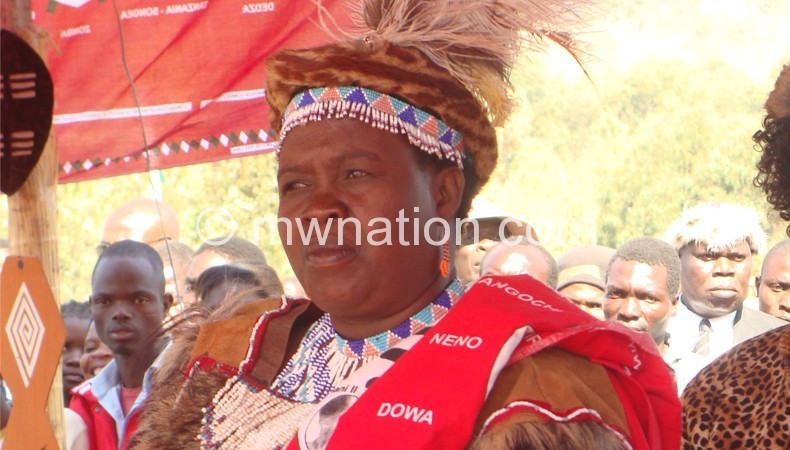T/A Kachindamoto: Will dissovle all child marriages
Child marriages are not a new phenomenon in his country. Non-governmental organisations (NGOs) have sprouted in response to fighting the vice and complimenting government’s efforts to rescue many girls and retain them in schools. The role of chiefs include creating a conducive environment for their subjects and Traditional Authority Kachindamoto has made child marriages her business and vows to end it. BRENDA TWEA spoke with her.
Scores of girls across the world end up as child brides, despite the practice being outlawed in many countries.

One bold chief, Dedza-based Traditional Authority (T/A) Theresa Kachindamoto has stood up against such practices, earning international recognition as a result while being negatively branded marriage terminator.
Numerous warnings to parents about the long-term ills of early marriages and child birth keep falling on deaf ears as most of them think it is best for the girl child to get married as they cannot afford to keep taking care of them, otherwise the families will be made poorer.
In just three years, the chief, who governs over 900 000 people has put an end to more than 850 child marriages, blacklisting herself in the hearts of many parents who would rather marry off their daughters and have one less burden to worry over.
The chief held meetings with community leaders, parents and families, but still faced challenges. It took bringing together 50 of her sub-chiefs to sign an agreement to abolish child marriages in their villages and, jointly, they agreed to end existing unions of child marriage as well.
When chiefs did not follow up on their promise (the by-law they came up with), she responded by firing four of them. It was, therefore, through changing and enforcing the law, along with community and social change efforts that she went from a secure office job to Chief Kachindamoto; the woman who stopped 850 child marriages in just three years, sending each of those children back to school.
She is such an inspiration and role model in the fight to end child marriage, that she recently hosted Karonga chiefs at her headquarters in the Central Region district.
One of the Karonga chiefs, Chief Kilupula reported that as chiefs, they were challenged to put a stop to this neglected crisis and he believes they, too, can do it by working with their subjects to confront the problem instead of keeping quiet about it.
Malawi has one of the highest rates of child marriages in the world, with one in two girls married by the age of 18. Upon her return home from Zomba where she held her secretarial job, Kachindamoto was shocked to see girls as young as 12 with babies and teenaged husbands. She then ordered the people to give up their ways, stressing that whether they liked it or not, the marriages had to be terminated.
Says Kachindamoto: “A few months after taking up my role as a chief here, I met a little girl with a child crying. I told her to take the baby to the mother and I was shocked when she told me she was the mother. I asked how old she was, and she said 13. And when I asked her where the baby’s father was, she pointed at a 14-year-old boy playing soccer with friends close by.
“I summoned their parents and they told me they were not in good shape financially and that they thought it was best the two children took care of each other. But I told them sternly that with me as chief, that practice had to stop.”
A key challenge to eradicating child marriages in the country is deep-rooted attitudes that accept the practice. Child marriage is also closely linked to poverty, as often in rural areas girls will be married off very young to improve a family’s financial status. In northern Malawi, kupimbira, or giving a young daughter in marriage as repayment for a debt, is practised.
To enforce her agenda of keeping girls away from marriage and in school, the Ngoni chief has also come up with a network of secret mothers and fathers in the villages, who check that parents are not pulling girls out of school.
She also calls some girls from town to come and talk about their jobs so that they serve as role models; as a way of inspiring girls to stay in school.
Last year, such motivation included sending Malawi’s female members of Parliament (MPs) to rural schools and the girls in the community suddenly became eager to learn English – the language spoken in Parliament. Kachindamoto has also been taking as many girls as she can from the village farms on trips to see bright city lights.
She is now asking Parliament to increase the minimum age of marriage from 18 to 21, in an effort to break a cycle of rural poverty. “If they are educated, they can be and have whatever they want,” she says.
Growing up, chief Kachindamoto probably never dreamed that she would one day ever influence so many people. She went to Masongola Secondary School in Zomba before enrolling for a typing course at Luangwa Shift Commercial School completing elementary, intermediary as well as advanced certificate levels.
In 1977 she started work as a typist at





